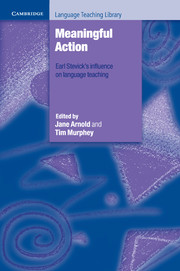Book contents
- Frontmatter
- Contents
- List of contributors
- Acknowledgements
- Preface
- Introduction
- Part A Meaning-making inside and between the people in the classroom
- Part B Meaningful classroom activity
- Part C Frameworks for meaningful language learning
- Epilogue: A way with words – perspectives on the contributions and influence of Earl W. Stevick
- Appendix: Words of tribute to Earl Stevick
- Index
11 - Adapting ways for meaningful action: ZPDs and ZPAs
Published online by Cambridge University Press: 15 November 2023
- Frontmatter
- Contents
- List of contributors
- Acknowledgements
- Preface
- Introduction
- Part A Meaning-making inside and between the people in the classroom
- Part B Meaningful classroom activity
- Part C Frameworks for meaningful language learning
- Epilogue: A way with words – perspectives on the contributions and influence of Earl W. Stevick
- Appendix: Words of tribute to Earl Stevick
- Index
Summary
… adaptation is inevitable; it ought therefore to receive more attention and more prestige than it usually does. The other theme is that language study is inevitably a total human experience; writers and teachers ought therefore to act as though it is.
(Stevick 1971: vii)Introduction
This chapter suggests three beneficial shifts concerning change and adaptation in the classroom. The first is to move from seeing learning in terms of the container metaphor, where knowledge is simply transferred by the teacher into a container (the learner's head) as if it were an entity (a thing), to a view of learning as an incremental process over time involving the participants adjusting to each other, the context and their goals. Second, to intensify engagement more with others in order to improve our techniques of observation and interaction. Third, to increase our contact with diversity so as to stimulate innovation and adaptation for a ‘total human experience’. I conclude that harmonizing, that is, being in rapport with others and enjoying a learning flow, is not a thing but an activity which demands continual adjusting to the various changes inside and between participants in a complex world.
Learning greatly depends on the ability of the people in learning encounters to adapt to each other in multiple ways to create meaningful actions that engage and motivate. It follows that this is not just a cognitive adjustment, but inevitably a total human experience. Earl Stevick wrote much about adapting and emphasized it often in his work. One of his early books was called Adapting and Writing Language Lessons (1971), on which I based my MA thesis, ‘Situationally Motivated Teacher Produced Texts’, where I proposed that teachers create their own texts adapted to local contexts and student needs. Later, I turned to more ‘situationally motivated student produced texts’, advocating that students could have a hand in producing many of the materials which would be even more relevant, at their level and intensely student-centred.
- Type
- Chapter
- Information
- Meaningful ActionEarl Stevick's Influence on Language Teaching, pp. 172 - 189Publisher: Cambridge University PressPrint publication year: 2013
- 2
- Cited by

